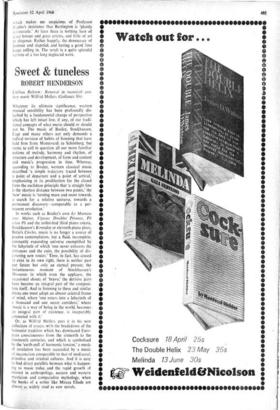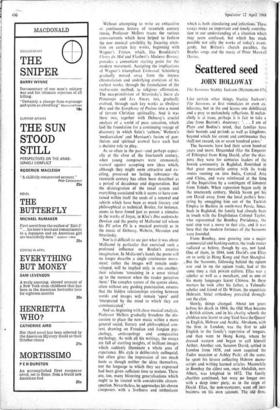Caliban Reborn : Renewal in twentieth cen-
Sweet & tuneless •
ROBERT HENDERSON •
tury music Wilfrid Mellers (Gollancz 30s) Whatever its ultimate significance, western musical sensibility has been profoundly dis- turbed by a fundamental change of perspective which has left intact few, if any, .of our tradi- tional concepts of what music should or should not be. The music of Boulez, Stockhausen, Cage and many others not only demands a radical revision of habits of listening that have held firm from Monteverdi to Schonberg, but seems to call in question all our more familiar notions of melody, harmony and rhythm, of structure and development, of form and content and music's progression in time. Whereas, according to Boulez, western classical music described 'a simple trajectory traced between a point of departure and a point of arrival,' emphasising in its predilection for the closed form the euclidean principle that 'a straight line is the shortest distance between two points,' the 'new' music is 'turning more and more towards a search for a relative universe, towards a permanent discovery—comparable to a per- manent revolution.'
In works such as Boulez's own Le Marteau sans Maitre, Figures Doubles Prismes, Pli scion Pli and the unfinished third piano sonata. Stockhausen's Kontakte or eleventh piano piece, Berio's Circles, music is no longer a source of passive contemplation, but a fluid, incomplete, constantly expanding universe exemplified by the labyrinth of which 'one never exhausts the entrances and the exits, the possibility of dis- covering new routes.' Time, in fact, has ceased tO exist in its own right, there is neither past nor future but only an eternal present, the instantaneous moment of Stockhausen's Momente in which even the applause, the occasional shouts of 'bravo,' the derisive jeers have become an integral part of the composi- tion itself. And in listening to these and similar pieces one must adopt an almost oriental frame of mind, where 'one enters into a labyrinth of a thousand and one secret corridors,', where `music is a way of being in the world, becomes an integral part of existence, is inseparably connected with it.'
Or, as Wilfrid Metiers puts it in his new collection of essays, with the breakdown of the humanist tradition which has dominated Euro- pean consciousness from the sixteenth to the nineteenth centuries, and which is symbolised by the 'earth-pull of harmonic tension,' a music of revelation has been succeeded by a music of incarnation comparable to that of mediaeval, primitive and oriental cultures. And it is easy to find direct parallels between what is happen- ing to music today_ and the rapid growth of interest in anthropology, eastern and western mysticism and comparative mythology, when the books of a writer like Mircea Eliade are almost as widely read as new novels. Without attempting to write an exhaustive or continuous history of twentieth century music, Professor Mellers traces the various cross-currents which have helped to fashion the new musical sensibility by focusing atten- tion on certain key works, beginning with Wagner's Tristan, which, like Baudelaire's Flews du Mal and Flaubert's Madame Bovary, provides a convenient starting point for the modern movement. Accepting the implications of Wagner's triumphant Liebestod, Schonberg gradually moved away from the intense chromaticism and underlying eroticism of his earliest works, through the formulation of the twelve-note method, to religious affirmation. The neo-primitivism of Stravinsky's Sacre du Printemps and Les Noces, too, gradually evolved, through such key works as Oedipus Rex and the Symphony of Psalms into a.mood of fervent Christian spirituality. And it was these two, together with Debussy's crucial analysis of a world of pure sensation, which laid the foundation for a continuing voyage of discovery in which Satie's 'cubism,' Webern's `mediaevalism' and Messiaen's fusioh of pan- theism and spiritual avowal have each had a decisive role to. play.
As so often in the past—and perhaps especi- ally at the close of the fourteenth century, when young composers were strenuously warned against accepting new ideas which, although they might seem attractive and ex- citing, possessed no lasting substance—the twentieth century has often been described as a period of decadence and degeneration. But the disintegration of the tonal system and everything associated with it seems to have con- tained within itself the seeds of a renewal and rebirth which have been as much literary and philosophical as technical. Boulez, for instance, seems to have found just as potent a stimulus in the works of Joyce, in Klee's Das malerische Denken and the poetry of Mallarme (of whom his Pli selon Pli is a musical portrait) as in the music of Debussy, Webern, Messaien and Stravinsky.
Nor is it difficult to see just what it was about Mallarme in particular that exercised such a profound influence on Boulez's creative imagination. In Mallarme's hands the poem will no longer describe a single continuous move- ment; rather the images will remain unde- veloped, will be implied only in one. another, their relations 'remaining in a sense virtual up to the moment when the reader perceives them.' The complex nature of the syntax alone, often without any guiding punctuation, ensures that the hidden relationships existing between words and images will remain 'open' until `interpreted by the mind to which they are communicated.'
And so, beginning with close musical analysis, Professor Mellers gradually broadens the dis- cussion to place the new music within a more general social, literary and philosophical con- text, drawing on Freudian and Jungian psy- chology, anthropology and comparative mythology. As with all his writings, the essays are full of startling insights, of brilliant images which suddenly illuminate a whole area of experience. His style it deliberately colloquial, but often gives the impression of too much haste as though neither the ideas themselves, nor the language in which they are expressed had been given sufficient time to mature. There are, too, many blistering generalisations which ought to be treated with considerable circum- spection. Nevertheless, he approaches his chosen composers with a liveliness and enthusiasm
which is both Stimulating and infectiotis.-These essays make an important and timely contribu- tion to our understanding of a situation which may seem confused, but which has made possible not only the works of today's avant- garde, but Britten's church parables, the Beatles songs and the music of Peter Maxwell Davies.











































 Previous page
Previous page